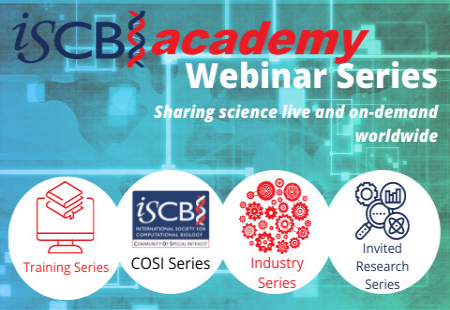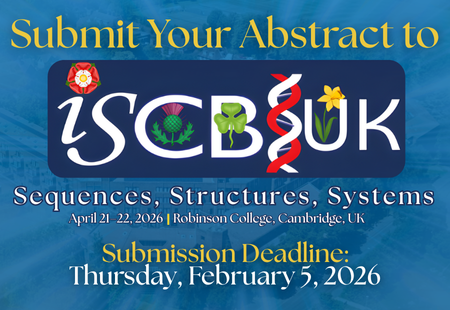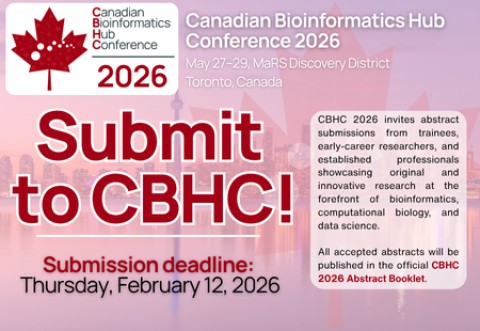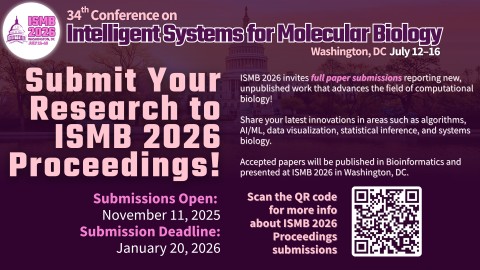Keynote Details
Presentation Title: Ultraconserved nonsense: gene regulation by splicing & RNA surveillance
Date: Sunday, July 11
Time: 9:00 a.m. – 10:00 a.m.
Room: Ballroom A/B
Abstract
 Nonsense-mediated mRNA decay (NMD) is a cellular RNA surveillance system that recognizes transcripts with premature termination codons and degrades them. We discovered large numbers of natural alternative splice forms that appear to be targets for NMD. This coupling of alternative splicing and RNA surveillance can be used as a means of gene regulation. We found that all conserved members of the human SR family of splice regulators have an unproductive alternative mRNA isoform targeted for NMD. Preliminary data suggest that this is used for creating a network of auto- and cross-regulation of splice factors. Strikingly, the splice pattern for each SR protein is shared with mouse, and each alternative splice is associated with an ultraconserved or highly-conserved region of ~100 or more nucleotides of perfect identity between human and mouse. We have recently dissected the evolutionary history of members of this family, discovering that while the unproductive splicing dates back to the pre-Cambrian, nearly every human SR gene has its own distinctive sequences for unproductive splicing. As a result, this elaborate mode of gene regulation has ancient origins and can involve exceptionally conserved sequences, yet after gene duplication it evolves swiftly and often.
Nonsense-mediated mRNA decay (NMD) is a cellular RNA surveillance system that recognizes transcripts with premature termination codons and degrades them. We discovered large numbers of natural alternative splice forms that appear to be targets for NMD. This coupling of alternative splicing and RNA surveillance can be used as a means of gene regulation. We found that all conserved members of the human SR family of splice regulators have an unproductive alternative mRNA isoform targeted for NMD. Preliminary data suggest that this is used for creating a network of auto- and cross-regulation of splice factors. Strikingly, the splice pattern for each SR protein is shared with mouse, and each alternative splice is associated with an ultraconserved or highly-conserved region of ~100 or more nucleotides of perfect identity between human and mouse. We have recently dissected the evolutionary history of members of this family, discovering that while the unproductive splicing dates back to the pre-Cambrian, nearly every human SR gene has its own distinctive sequences for unproductive splicing. As a result, this elaborate mode of gene regulation has ancient origins and can involve exceptionally conserved sequences, yet after gene duplication it evolves swiftly and often.
Whitehead Institute for Biomedical Research
Massachusetts Institutes of Technology
Howard Hughes Medical Institute
Cambridge, USA
Presentation Title: Protein Folding and Environmental Stress Redraw the Relationship between Genotype and Phenotype
Date: Sunday, July 11
Time: 4:30 p.m. – 5:30 p.m.
Room: Ballroom A/B
Abstract
Heat shock proteins (Hsps) promote the folding and maturation of many other proteins in the cell, and exert a profound effect on how genotypes are translated into phenotypes. Hsp90 is a specialized molecular chaperone that works on a particularly interesting group of client proteins: metastable signal transducers that are key regulators of a broad spectrum of biological processes. Importantly, the folding of Hsp90 clients is particularly sensitive to changes in the environment. Our work has helped to define two mechanisms by which Hsp90 might influence the acquisition of new phenotypes. First, by robustly maintaining signaling pathways, Hsp90 can buffer the effects of mutations, allowing the storage of cryptic genetic variation. In this case, when the Hsp90 buffer is compromised by environmental stress, new traits appear. These traits can be assimilated, so that they become manifest even in the absence of stress, by enrichment of the underlying genetic variation in subsequent generations. Second, Hsp90 can potentiate the effects of genetic variation, allowing new mutations to produce immediate phenotypes. In this case, when Hsp90 function is compromised, new traits are lost. In this case assimilation may be achieved through new mutations. In our most recent work, we have mapped hundreds of traits in ecologically diverse strains of Saccharomyces cerevisiae, identified specific polymorphisms involved, and established that Hsp90 has played a broad and pervasive role in shaping current genomes.
Biography
Presentation Title: Analyses of Pleistocene Genomes
Date: Monday, July 12
Time: 9:00 a.m. – 10:00 a.m.
Room: Ballroom A/B
Abstract
Harvard Medical School;
Massachusetts General Hospital and Broad Institute of Harvard and MIT
Cambridge, USA
Presentation Title: Genomic Variation and the Inherited Basis of Common Disease
Date: Tuesday, July 13
Time: 9:00 a.m. – 10:00 a.m.
Room: Ballroom A/B
Abstract
Despite great progress in medical science, we have limited knowledge of the molecular causes of disease in human populations; this ignorance is one of the gating factors in efforts to design rationale approaches to prevent and treat disease. Family history is a strong and largely unexplained contributor to essentially all human diseases, and genetic mapping offers an approach to study disease that is unbiased by prior hypotheses about disease mechanisms. We have worked to make possible genetic mapping of common diseases by developing maps of human sequence variation (the SNP Consortium HapMap, and 1000 Genomes Projects), and by developing technologies and analytical methods to enable genome-wide association studies. In the past three years these methods have led to the identification of over 250 novel and reproducible SNP associations for a wide variety of common diseases, including our own work on type 2 diabetes, hyperlipidemia, prostate cancer, age related macular degeneration, rheumatoid arthritis, and systemic lupus erythematosis. We are now focusing on discovering the genes and mutations responsible at each locus, extending the mapping approach to query all genetic variation (not only common variants), and using this information to gain new insights into disease mechanisms, with the ultimate goal of developing new targets for therapeutic intervention and disease prevention.
Biography

(Photo by: Len Rubenstein)
Endocrinologist and human geneticist David Altshuler is a founding member of the Broad Institute and serves as director of the Broad’s Program in Medical and Population Genetics, as well as the Institute’s first Deputy Director and Chief Academic Officer. David is one of the world’s leading scientists in the study of human genetic variation and its application to disease, using tools and information from the Human Genome Project. He has been a lead investigator in The SNP Consortium, the International HapMap Project, and the 1,000 Genomes Project - public-private partnerships that have created public maps of human genome sequence variation as a foundation for disease research.
His work has contributed to the understanding of gene variants that influence the risk of common conditions, including type 2 diabetes, blood cholesterol, prostate cancer, systemic lupus erythematosis, and rheumatoid arthritis. These studies provide new clues about the mechanisms that cause these diseases, and more generally, provide a blueprint for analyzing the role of genetic variations in human health.
David is also a professor of genetics and medicine at Harvard Medical School, and in the department of molecular biology at the Center for Human Genetic Research, as well as the Diabetes Unit at Massachusetts General Hospital.
Presentation Title: BI/O: Reading and Writing Genomes
Date: Tuesday, July 13
Time: 5:15 p.m. – 6:15 p.m.
Room: Ballroom A/B
Biography
Professor of Genetics, Harvard Medical School, Director of the Center for Computational Genetics. 1984 Harvard PhD included the first direct genomic sequencing method, molecular multiplexing tags, which lead to automation & software used at Genome Therapeutics Corp. for the first commercial genome sequence -- pathogen, Helicobacter in 1994. This multiplex solid-phase sequencing evolved into polonies (1999), ABI-SOLiD (2005) & open-source Polonator.org (2007). Innovations in homologous recombination and array-based DNA reading & writing lead to current research in Human Genomics (Complete Genomics, PersonalGenomes, 23andme, Knome) & synthetic biology (SynBERC, JouleBio, LS9) & new ethics/security strategies.
Website: http://arep.med.harvard.edu
ISCB Senior Scientist Prize Lecture
Presentation Title: Systems Biology of Cancer Cells
Date: Monday, July 12
Time: 4:30 p.m. – 5:30 p.m.
Room: Ballroom A/B
Abstract
The talk will connect pathway analysis of complex cancer genotypes from The Cancer Genome Atlas and a new computational-experimental approach to cell biology. The pathway analysis of many individual cancer profiles led to the concept of common specification and individual implementation of oncogenic programs and to the notion of pathway-oriented therapeutic perturbation. To make perturbational cell biology more computable, we have developed a statistical method for deriving predictive network models from high-throughput molecular measurements of systematically perturbed cellular systems. The network models aim to predict quantitatively the molecular and physiological outcomes of unseen perturbations, such as drug treatments or multiple genetic alterations. We anticipate useful applications in network pharmacology and the design of combinatorial cancer therapy.
Biography
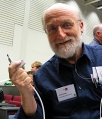
Presentation Title: Cancer Stem Cells and the Evolution of Malignancy
Date: Tuesday, July 13
Time: 4:15 p.m.-5:15 p.m.
Room: Ballroom A/B
Abstract
Biography

Dr. Robert A. Weinberg is a Founding Member of the Whitehead Institute for Biomedical Research and Professor of Biology at the Massachusetts Institute of Technology. The Weinberg lab is known for its discoveries of the first human oncogene – the ras oncogene that causes normal cells to form tumors, and the isolation of the first known tumor suppressor gene - the Rb gene.
Website: http://inside.wi.mit.edu/weinberg/pub/index.html

